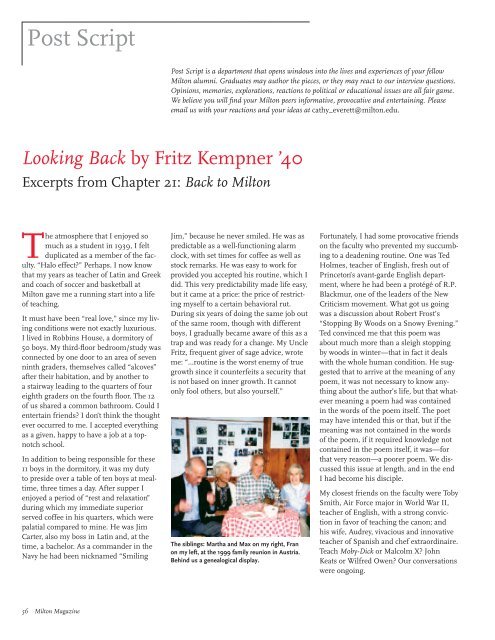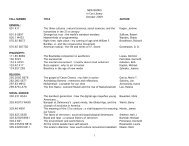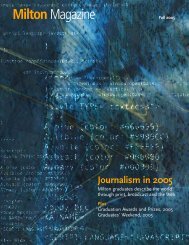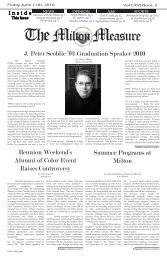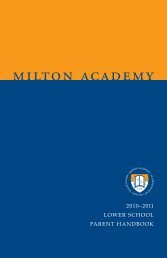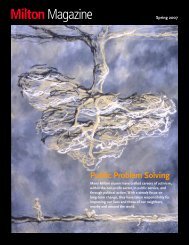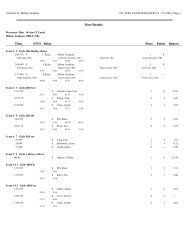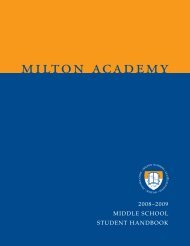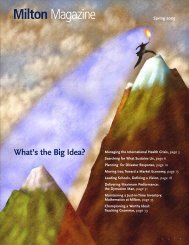Post ScriptPost Script is a department that opens windows into the lives and experiences of your fellow<strong>Milton</strong> alumni. Graduates may author the pieces, or they may react to our interview questions.Opinions, memories, explorations, reactions to political or educational issues are all fair game.We believe you will find your <strong>Milton</strong> peers informative, provocative and entertaining. Pleaseemail us with your reactions and your ideas at cathy_everett@milton.edu.Looking Back by Fritz Kempner ’40Excerpts from Chapter 21: Back to <strong>Milton</strong>The atmosphere that I enjoyed somuch as a student in 1939, I feltduplicated as a member of the faculty.“Halo effect?” Perhaps. I now knowthat my years as teacher of Latin and Greekand coach of soccer and basketball at<strong>Milton</strong> gave me a running start into a lifeof teaching.It must have been “real love,” since my livingconditions were not exactly luxurious.I lived in Robbins House, a dormitory of50 boys. My third-floor bedroom/study wasconnected by one door to an area of sevenninth graders, themselves called “alcoves”after their habitation, and by another toa stairway leading to the quarters of foureighth graders on the fourth floor. The 12of us shared a common bathroom. Could Ientertain friends? I don’t think the thoughtever occurred to me. I accepted everythingas a given, happy to have a job at a topnotchschool.In addition to being responsible for these11 boys in the dormitory, it was my dutyto preside over a table of ten boys at mealtime,three times a day. After supper Ienjoyed a period of “rest and relaxation”during which my immediate superiorserved coffee in his quarters, which werepalatial compared to mine. He was JimCarter, also my boss in Latin and, at thetime, a bachelor. As a commander in theNavy he had been nicknamed “SmilingJim,” because he never smiled. He was aspredictable as a well-functioning alarmclock, with set times for coffee as well asstock remarks. He was easy to work forprovided you accepted his routine, which Idid. This very predictability made life easy,but it came at a price: the price of restrictingmyself to a certain behavioral rut.During six years of doing the same job outof the same room, though with differentboys, I gradually became aware of this as atrap and was ready for a change. My UncleFritz, frequent giver of sage advice, wroteme: “…routine is the worst enemy of truegrowth since it counterfeits a security thatis not based on inner growth. It cannotonly fool others, but also yourself.”The siblings: Martha and Max on my right, Franon my left, at the 1999 family reunion in Austria.Behind us a genealogical display.Fortunately, I had some provocative friendson the faculty who prevented my succumbingto a deadening routine. One was TedHolmes, teacher of English, fresh out ofPrinceton’s avant-garde English department,where he had been a protégé of R.P.Blackmur, one of the leaders of the NewCriticism movement. What got us goingwas a discussion about Robert Frost’s“Stopping By Woods on a Snowy Evening.”Ted convinced me that this poem wasabout much more than a sleigh stoppingby woods in winter—that in fact it dealswith the whole human condition. He suggestedthat to arrive at the meaning of anypoem, it was not necessary to know anythingabout the author’s life, but that whatevermeaning a poem had was containedin the words of the poem itself. The poetmay have intended this or that, but if themeaning was not contained in the wordsof the poem, if it required knowledge notcontained in the poem itself, it was—forthat very reason—a poorer poem. We discussedthis issue at length, and in the endI had become his disciple.My closest friends on the faculty were TobySmith, Air Force major in World War II,teacher of English, with a strong convictionin favor of teaching the canon; andhis wife, Audrey, vivacious and innovativeteacher of Spanish and chef extraordinaire.Teach Moby-Dick or Malcolm X? JohnKeats or Wilfred Owen? Our conversationswere ongoing.56 <strong>Milton</strong> <strong>Magazine</strong>
While <strong>Milton</strong> took academics seriously, itdid not neglect the spiritual. There weretwo compulsory Chapel services: one onSunday evenings, with a sermon by a minister,and one on Wednesday mornings,with a talk by a faculty member.When it came my turn for a Wednesdaymorning talk, I used the opportunity todescribe my view on religion, as revealedin Lessing’s 1779 play Nathan The Wise. Iknow it well, having recited it in a familysetting as a teenager. Here it is, in brief:Once upon a time in the Orient therelived a man who owned a ring of greatworth that had the special power to makethe wearer beloved in the eyes of Godand men. This ring passed from fatherto favored son until it came to a father ofthree sons, all equally deserving. What todo? The father had two identical copiesmade and gave each son a ring; he thendied. Each son believed that his ring wasthe true one. They argued fiercely. Unableto agree, they sought out a judge to decidethe issue. Said the judge, “Since it isimpossible to prove which ring is the genuineone, I suggest this: Let each of youdemonstrate his belief in the power of hisring by conducting his life in such a mannerthat he fully merits the love of God andmen. The outcome of your lives will be areflection of the power of the ring.”The three “Religions of the Book”—Judaism, Christianity and Islam—each relyon a written tradition handed down overmany centuries. Setting aside conversions,believers base their faith on what they haveread or what they have been brought upto believe. Which faith is the most valid? Icannot consider one tradition superior tothe other two. To me, what’s most importantin our lives is not our faith, but howwe act. Or, to use the parable of the threerings: It is up to the owner of each ringto prove his or her ring genuine. The realtest will be the quality of life that a personhas led. As Matthew 7:16 puts it, “You willknow them by their fruits.”You Must Remember This:A Reporter’s Odyssey from Camelot toGlasnost by Lansing Lamont ’48Excerpts from Chapter 5:A.O., Sally Rand and the Athenian EffectMy mother was convinced I neededstricter supervision at a moregenteel correctional facility thanthe one my father and brothers had attended.So to Father’s dismay, I was air mailednot to Exeter but to <strong>Milton</strong> <strong>Academy</strong>, anivied cloister of Yankee rectitude situatedjust south of Boston.<strong>Milton</strong> was a brief trolley ride from downtownBoston. The school authorities spentas much time protecting us from the sinsof Scollay Square’s burlesque and moviehouses as they did promoting the virtuesof Horace and Cicero. Mostly our sinningwas confined to the occasional hike to thevillage ice-cream parlor.Life as a lowly boarder was predictablymonastic: bone-chilling New Englandnights, cramped dormitory cubicles, bullyingupperclassmen, an endless diet ofchipped beef on toast. Chapel and Sundaychurch were mandatory; we dosed out onGod. Our housemaster, a genial formerpro baseball player, urged us to persevereand “keep rounding the bases.” His deputy,a dead ringer for Sidney Greenstreet,took to calling me “fer-de-lance” (a pitviper), which, in my ignorance, I took as acompliment.The <strong>Academy</strong>’s headmaster, a dapperchap with a clipped mustache, was adeptat cajoling checks from the Brookline andBack Bay mothers whose young chargeshe supervised. The <strong>Academy</strong> also harboreda separate girls’ school down the road, avery good one, which was run by a formidabledreadnaught named Miss Faulkner;<strong>Milton</strong> wasn’t yet coed, a term that vaguelyoffended Brahmin sensibilities. The boys’school principal was a tweedy beanpolenamed Arthur Perry, who came from adistinguished line of educators and whoseeyes perpetually twinkled behind a pair ofrimless glasses. Mr. Perry’s annual readingat assembly of Dickens’ A Christmas Carolwas as eagerly anticipated as the Great TreeFrog Dissection conducted each spring inMr. LeSourd’s science class.<strong>Milton</strong>’s motto was “Dare to Be True,”proclaimed in plain English with none ofthe fancy Latin varnish favored by otherschools. The teachers were a sturdy lot,disciplined, demanding, occasionally firedwith passion. If they were more sage thaninspired, it may have been because mostwere seriously aging, their younger colleaguesstill finishing off the war. All thatchanged for me with the arrival in 1946 ofAlbert O. Smith, our new English teacher.A.O. was lately discharged from the AirForce and eager to get on with his career.He was unmarried and unconforming, alanky character with smoke-stained teethand a quizzical smile. Most days he worea frayed button-down shirt and a tiredsports coat that dropped to his knees. Hewas rumored to knock down a bourbon ortwo and some mornings appeared in classa little worse for wear. His classroom stylewas Socratic-casual, something we were<strong>Milton</strong> <strong>Magazine</strong> 57


